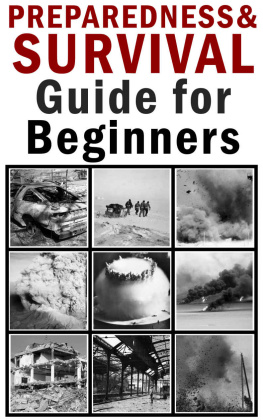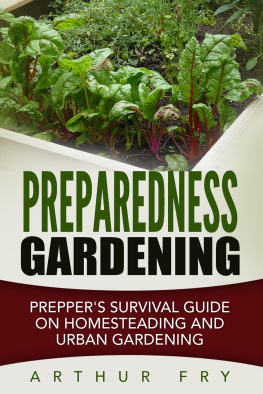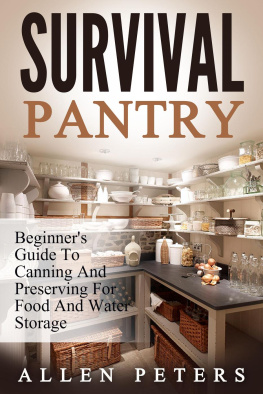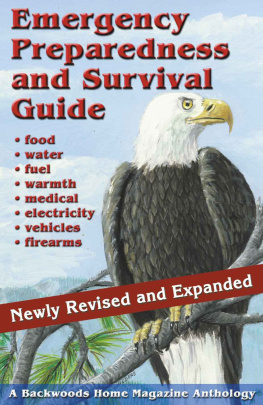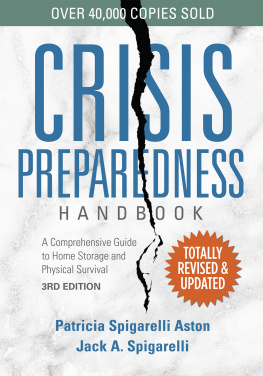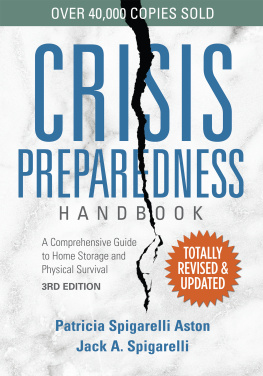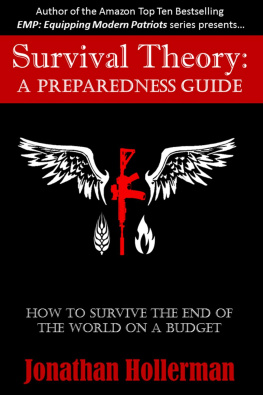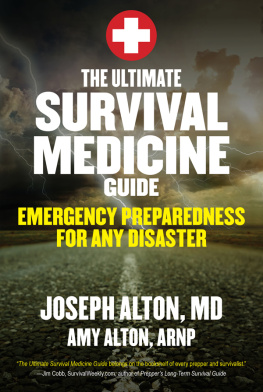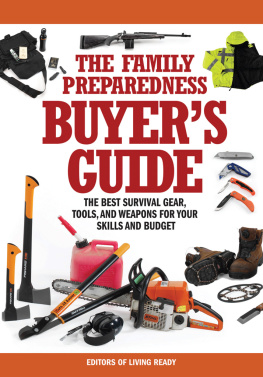Vitaly Pedchenko - Preparedness and Survival Guide for Beginners
Here you can read online Vitaly Pedchenko - Preparedness and Survival Guide for Beginners full text of the book (entire story) in english for free. Download pdf and epub, get meaning, cover and reviews about this ebook. year: 2014, genre: Home and family. Description of the work, (preface) as well as reviews are available. Best literature library LitArk.com created for fans of good reading and offers a wide selection of genres:
Romance novel
Science fiction
Adventure
Detective
Science
History
Home and family
Prose
Art
Politics
Computer
Non-fiction
Religion
Business
Children
Humor
Choose a favorite category and find really read worthwhile books. Enjoy immersion in the world of imagination, feel the emotions of the characters or learn something new for yourself, make an fascinating discovery.
- Book:Preparedness and Survival Guide for Beginners
- Author:
- Genre:
- Year:2014
- Rating:4 / 5
- Favourites:Add to favourites
- Your mark:
- 80
- 1
- 2
- 3
- 4
- 5
Preparedness and Survival Guide for Beginners: summary, description and annotation
We offer to read an annotation, description, summary or preface (depends on what the author of the book "Preparedness and Survival Guide for Beginners" wrote himself). If you haven't found the necessary information about the book — write in the comments, we will try to find it.
Preparedness and Survival Guide for Beginners — read online for free the complete book (whole text) full work
Below is the text of the book, divided by pages. System saving the place of the last page read, allows you to conveniently read the book "Preparedness and Survival Guide for Beginners" online for free, without having to search again every time where you left off. Put a bookmark, and you can go to the page where you finished reading at any time.
Font size:
Interval:
Bookmark:
Preparedness and Survival Guide for Beginners
By http://www.PrepperSurvivor.com
When you are done reading, please write a review on Amazon: http://amzn.to/1e84mhB
Get More eBooks on Kindle for FREE:
Must Have AR-15 Upgrades
FREE Gun Safety Guide
Useful Links:
7 Best Bug Out Bags
Best Tents for Survival
Preparedness Food Storage List
Preppers Must Have List
CONTENTS
CHAPTER 1 - Why Being Prepared For a Disaster Is Important
| Super Storm Sandy ripped up the eastern seaboard of the United States, leaving death and destruction in its path. While everyone knew the storm's path and when it would strike, people and the community as a whole were caught off guard by the devastation. Super Storm Sandy is an example of why preparing for the worst-case scenario is the prudent path to take. |
The people and community in the storm's path had prepared based on their experiences with storms in the past. However they did not prepare for the worst-case scenario. The city's aging infrastructure contributed greatly to the devastation because it failed almost immediately when the storm hit, which apparently was not taken into account during preparations.
Denial, procrastination and economics were all a factor in why some did not prepare for the storm. A majority of the people failed to recognize what effect the storm surge and the subsequent flooding would have on them. The recommended 72 hours worth of supplies is outdated given the state of infrastructures in most cities and towns. You have to assume you will be on your own for at least 10 to 14 days. To assume otherwise means you will not have enough food or water and must rely on disaster relief agencies that apparently had problems getting personnel into the disaster area. Knowing this and knowing this has been a problem in the past, you cannot assume agencies will be on the ground in your area in a timely manner.
Everyone must rethink their disaster preparedness because there is confusion as to what the government's role is and what a citizen's responsibility is during a crisis. If you properly prepare, you will not have to rely on government agencies that closed offices because of the weather. Additionally, you cannot predict what a storm will do based on past storms. Self-reliance is important to ensure you and your family survives. The storm, even though it was forecasted to be a super storm, was never classified as a hurricane. This likely played a role in how people prepared.
You always want to be in position where you have too much and not enough supplies. Emergency disaster supplies are not crisis specific. In other words, if you do have a surplus then they can be used for the next calamity, which is sure to strike. It is not a matter of if, but simply a matter of when the next disaster makes landfall. Your priorities are shelter, water, fire, energy and food. You must plan for extended utility outages and realize you may not have contact with disaster agencies for days or even longer. You essentially will be trapped in your home or surrounding neighborhood because of damaged roads and washed out bridges. Any disaster from tornadoes to blizzards can trap you in your home without electricity, gas or water.
The dependence on gasoline was readily apparent during recent events. Society is so dependent that some will resort to violence to get enough to run their generators. The storm also showed people that they cannot rely on just one plan and that they must have a backup plan. Generators failed because they were installed in some cases, below ground level, which of course were the first to be flooded. Other situations were more tragic because people failed to understand the dangers of toxic fumes from their generators. This is what being prepared is all about. Do you know where to install and operate your generators safely? Are they protected from disasters? These questions and more must be addressed when preparing for any disaster. Planning is crucial and you must always have a contingency plan if your generator fails or the power is out for longer than you expected. Expect the worst and do not be surprised by the unexpected. You must plan for the unexpected.
Useful Links:
Communications During a Crisis Using Citizens Band/Two Way Radios
First Aid Kits for Survival
Best Emergency Water Sources for Survival
Choosing the Right Sleeping Bag
Finding Water in the Wild
Choosing the Perfect Backpack
7 Best Bug Out Bags
Best Tents for Survival
Preparedness Food Storage List
Preppers Must Have List
CHAPTER 2 - Types of Disasters That Can Happen
| Anything can happen to anyone at anytime. A disaster can strike you as an individual or as a family, or strike an entire community, state or country. Natural disasters happen so frequently to the point where some people simply go through the motions when preparing. However, given the state of the world today, manmade disasters are becoming more of a possibility. Rogue nations are always looking for ways to create havoc and eventually they will succeed in creating a disaster. Therefore, when considering which types of disasters are possible you must consider manmade ones as well. |
- Tornadoes typically follow severe thunderstorms, but they are still unpredictable. These storms can cause structural damage to homes and businesses, power disruptions and fatalities from flying debris and collapsing buildings. Heavy rains sometimes associated with tornadoes can cause flash flooding as well. Expect local to widespread power disruptions and given the nature of tornadoes, entire neighborhoods could be destroyed or the storm may only level one structure in an area. The storms move fast and their effects can be as devastating in some cases as the storm itself.
- Hurricanes are predictable and their progress can be tracked by satellite. Experts can predict when and where they will make landfall with a great deal of accuracy. What cannot be predicted is their destructiveness once they make landfall. Storm surges from high winds typically accompany hurricanes. The surges create flooding and the seawater can contaminate wells, rivers and surface bodies of water. The flooding can also cause raw sewage to be present on the surface, which can contaminate the floodwaters and drinking water resources. The effects are damaged structures from wind and flooding. Expect widespread electrical and other utility disruptions as well as damaged roads and bridges.
- Blizzards can close highways, collapse buildings from the weight of the snow collecting on roofs, and bring down trees and power lines. Cold temperatures are also a factor and fatalities are caused by falling branches, downed power lines, traffic accidents and hypothermia. Expect local power disruptions and limited travel. Blizzards are forecasted when there are favorable weather conditions.
- Earthquakes are not predictable and can strike virtually anywhere at any time. To determine if an area is prone to earthquakes, experts can only rely on what has happened in the past. Earthquakes can cause widespread damage to buildings and infrastructures. Fatalities are caused by collapsed buildings, bridges and falling debris. Expect in some cases extensive damage to local infrastructure, which means it could be weeks before power is restored to certain areas.
Font size:
Interval:
Bookmark:
Similar books «Preparedness and Survival Guide for Beginners»
Look at similar books to Preparedness and Survival Guide for Beginners. We have selected literature similar in name and meaning in the hope of providing readers with more options to find new, interesting, not yet read works.
Discussion, reviews of the book Preparedness and Survival Guide for Beginners and just readers' own opinions. Leave your comments, write what you think about the work, its meaning or the main characters. Specify what exactly you liked and what you didn't like, and why you think so.

